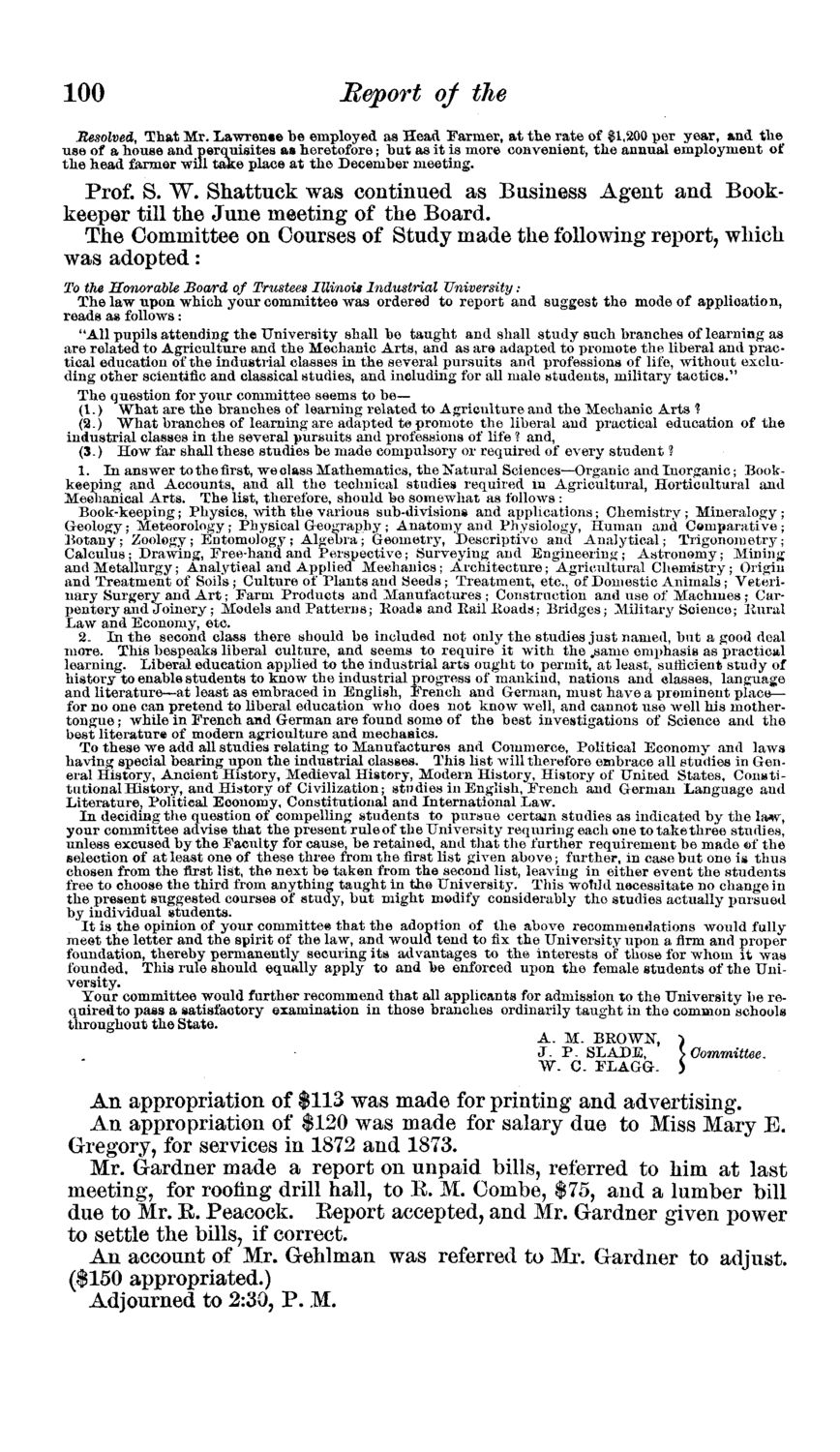| |
| |
Caption: Board of Trustees Minutes - 1874
This is a reduced-resolution page image for fast online browsing.

EXTRACTED TEXT FROM PAGE:
100 Report of the Besolved, That Mr. Lawrence be employed as Head Farmer, at the rate of $1,200 per year, and the use of a house and perquisites as heretofore; but as it is more convenient, the annual employment of the head farmer will take place at the December meeting. Prof. S. W. Shattuck was continued as Business Agent and Bookkeeper till the June meeting of the Board. The Committee on Courses of Study made the following report, which was adopted: To the Honorable Board of Trustees Illinois Industrial University : The law upon which your committee was ordered to report and suggest the mode of application, reads as follows: "All pupils attending the University shall be taught and shall study such branches of learning as are related to Agriculture and the Mechanic Arts, and as are adapted to promote the liberal and practical education of the industrial classes in the several pursuits and professions of life, without excluding other scientific and classical studies, and including for all male students, military tactics." The question for your committee seems to be— (1.) What are the branches of learning related to Agriculture and the Mechanic Arts ? (2.) What branches of learning are adapted to promote the liberal and practical education of the industrial classes in the several pursuits and professions of life ? and, (3.) How far shall these studies be made compulsory or required of every student ? 1. In answer to the first, we class Mathematics, the Natural Sciences—Organic and Inorganic; Bookkeeping and Accounts, and all the technical studies required in Agricultural, Horticultural and Mechanical Arts. The list, therefore, should be somewhat as follows : Book-keeping; Physics, with the various sub-divisions and applications; Chemistry ; Mineralogy ; Geology; Meteorology ; Physical Geography ; Anatomy and Physiology, Human and Comparative ; Botany ; Zoology ; Entomology ; Algebra; Geometry, Descriptive and Analytical; Trigonometry; Calculus ; Drawing, Free-hand and Perspective; Surveying and Engineering ; Astronomy; Mining and Metallurgy; Analytical and Applied Mechanics; Architecture; Agricultural Chemistry; Origin and Treatment of Soils; Culture of Plants and Seeds ; Treatment, etc., of Domestic Animals; Veterinary Surgery and A r t ; Farm Products and Manufactures ; Construction and use of Machines ; Carpentory and Joinery; Models and Patterns; Roads and Rail lioads; Bridges; Military Science; Rural Law and Economy, etc. 2. In the second class there should be included not only the studies just named, but a good deal more. This bespeaks liberal culture, and seems to require it with the .same emphasis as practical learning. Liberal education applied to the industrial arts ought to permit, at least, sufficient study of history to enable students to know the industrial progress of mankind, nations and classes, language and literature—at least as embraced in English, French and German, must have a prominent place— for no one can pretend to liberal education who does not know well, and cannot use well his mothertongue ; while in French and German are found some of the best investigations of Science and the best literature of modern agriculture and mechanics. To these we add all studies relating to Manufactures and Commerce, Political Economy and laws having special bearing upon the industrial classes. This list will therefore embrace all studies in General Ilistory, Ancient History, Medieval History, Modern History, History of United States, Constitutional History, and History of Civilization; studies in English, French and German Language and Literature, Political Eoonomy, Constitutional and International Law. In deciding the question of compelling students to pursue certain studies as indicated by the la*v, your committee advise that the present rule of the University requiring each one to take three studies, unless excused by the Faculty for cause, be retained, and that the further requirement be made ©f the selection of at least one of these three from the first list given above; further, in case but one is thus chosen from the first list, the next be taken from the second list, leaving in either event the students free to choose the third from anything taught in the University. This would necessitate no change in the present suggested courses of study, but might modify considerably the studies actually pursued by individual students. I t is the opinion of your committee that the adoption of the above recommendations would fully meet the letter and the spirit of the law, and would tend to fix the University upon a firm and proper foundation, thereby permanently securing its advantages to the interests of those for whom it was founded. This rule should equally apply to and be enforced upon the female students of the University. Your committee would further recommend that all applicants for admission to the University be required to pass a satisfactory examination in those branches ordinarily taught in the common schools throughout the State. A. M. BROWN, ) J . P . SLADE, } Committee. W . C. FLAGG. > An appropriation of $113 was made for printing and advertising. An appropriation of $120 was made for salary due to Miss Mary E. Gregory, for services in 1872 and 1873. Mr. Gardner made a report on unpaid bills, referred to him at last meeting, for roofing drill hall, to E. M. Combe, $75, and a lumber bill due to Mr. E. Peacock. Eeport accepted, and Mr. Gardner given power to settle the bills, if correct. An account of Mr. Gehlman was referred to Mr. Gardner to adjust. ($150 appropriated.) Adjourned to 2:30, P . M.
| |